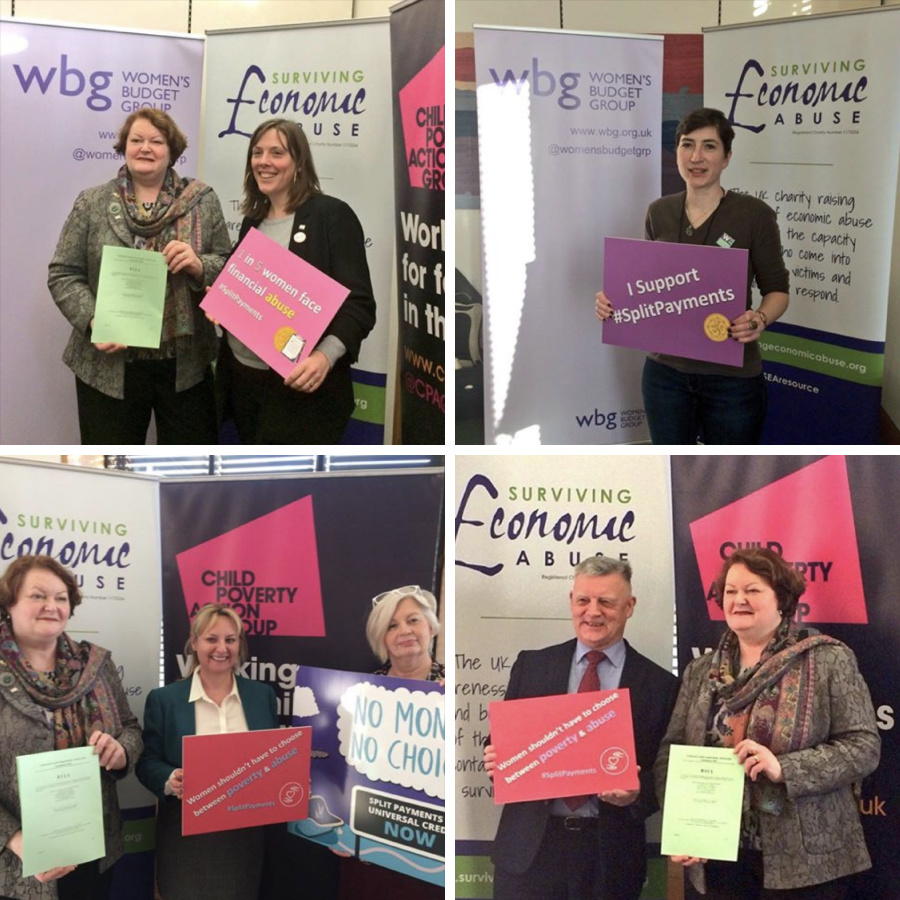In 2010 the newly elected Coalition government proposed a major change to the UK social security system, with the introduction of Universal Credit (UC). UC is a new meanstested benefit replacing six meanstested benefits and tax credits, including Jobseeker’s Allowance and Employment and Support Allowance, Housing Benefit, Income Support, and Child and Working Tax Credit. The aim was to simplify the social security system and ensure people were always better off in work. The implementation of Universal Credit was repeatedly delayed, its design and implementation proved more complex than anticipated. However it is now being rolled out across the country.
WBG’s analysis has shown a number of problems with Universal Credit. As with the previous tax credit system, couples are assessed jointly, with payments reduced if the claimant (and their partner where relevant) have other income. Where earnings are concerned, some claimants have a ‘work allowance’, meaning they can earn up to a certain amount before UC starts to be reduced. As with tax credits, the ‘first earner’ in a couple (often the man) may use up the couple’s work allowance, reducing the incentive for the ‘second earner’ to take up paid work or increase their earnings. Universal Credit has a higher withdrawal rate than previous tax credits, further reducing the incentive for second earners. This puts women at greater risk of poverty in old age.
Universal Credit replaces a series of separate payments with a monthly single payment, which makes it difficult to budget and means that if there are delays or administrative problems jobless households risk losing most of their income.
Universal Credit payments will be made into a single bank account. This may be a joint account, but this may not guarantee equal access or control over that account. This ignores the importance to women of having money of their own and could well lead to power imbalances in relationships. It may also mean a higher risk of financial abuse, and greater difficulty for women to have access to money to meet their own and their children’s needs and to leave abusive relationships. Alternative payments can be made in limited circumstances. Following campaigns by women’s organisations (including the Scottish Women’s Budget Group) the Scottish Government agreed that Universal Credit payments can be split. Similar commitments have been made in Northern Ireland. However, the UK government insists on single payments for England and Wales.
Since Universal Credit was first proposed WBG has worked to highlight its likely impact on gender equality through a series of briefings and parliamentary submissions. WBG members gave evidence to the Work and Pensions Parliamentary Select Committee when they were considering UC. We helped draft amendments aimed at removing some of the worst elements of the system, although these were unsuccessful. The implementation of Universal Credit was repeatedly delayed as its design and implementation proved more complex than anticipated. However, it is now being rolled out across the country.
With the roll out of UC there has been renewed interest in the issue among back bench MPs. WBG worked with the End Violence Against Women coalition (a coalition of organisations working on violence against women) and Surviving Economic Abuse (an organisation set up to highlight the issue of financial and economic abuse in relationships) to produce a joint report on UC and financial abuse. We have held round table meetings to highlight the problem and discuss alternative payment mechanisms. We have worked with parliamentarians from across the political parties to raise the issue through parliamentary questions, meetings and on social media.
This campaign is still ongoing. Following campaigns by women’s organisations (including the Scottish Women’s Budget Group, our sister organisation in Scotland) the Scottish Government agreed that Universal Credit payments can be split. Similar commitments have been made in Northern Ireland. WBG UK is highlighting the Scottish experience to challenge the UK Government claim that it would not be possible to split payments in the hope that this will lead to a change of policy.

